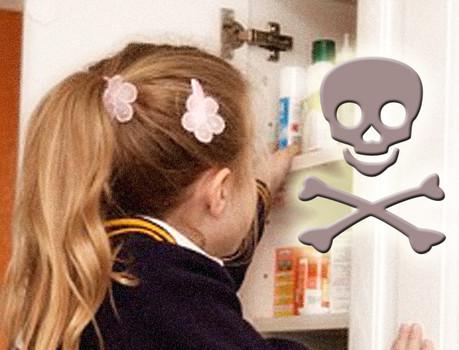
Small children will put just about anything in their mouths, and while a little dirt never hurt anyone, it’s all too easy for little ones to get their hands on a harmful substance. It’s estimated that accidental poisonings lead to three deaths in children under 14 and 900 hospitalizations for serious injuries every year. A lot of things you use every day can make kids very sick very quickly—vitamins, laundry detergent packs, plants and even mouthwash.
Read on to learn about the simple steps you can take to keep your kids safe.
Medications and vitamins
Did you know that medication is the leading cause of poisonings in Canadian kids? A small adult dose can be lethal to a tot. Keep any current prescriptions, over-the-counter meds and vitamins in their original containers inside a locked cabinet or box and out of sight. And keep in mind that a child-resistant cap isn’t always childproof—some kids are little Houdinis when it comes to popping off those tops.
How you talk about medication is important, too. Make sure to never call medications or vitamins candy or any other names that would be appealing to kids. When you need to give your little one a medication, carefully read the label for proper dosage and always use the dosing device provided for liquid meds (never a kitchen spoon).
Also keep in mind that visitors could have a medication with them when they drop by (hi, grandma and grandpa!)—so make sure their purse, bag or jacket is up high and out of reach.
If you have unused or expired medicines to get rid of, don’t just toss them in the garbage where a curious little one (or pet!) could find it. Take it to a pharmacy for proper disposal.
Laundry and dishwashing packs
Laundry and dishwashing packs have come under fire for their small squishy appearance and potentially fatal concentrated contents. If you use laundry or dishwashing capsules, be sure to keep them far out of reach (and out of sight) of kids, and make sure the container is always properly closed.
When you’re doing the laundry or the dishes, don’t set a pack out where your kid could get her hands on it (like on top of your basket of laundry). All it takes is a few seconds while your back is turned for your curious cutie to get into serious trouble.
Household cleaners
When you have a kid, you’re going to be cleaning up a lot of messes—and cleaning products are a trusted friend. Even if you stick with all-natural cleaners, they’re still hazardous if ingested. You might store your go-to lemon-scented cleaner under the kitchen sink, but even if there’s a lock on the cabinet, it’s better to keep your cleaners up high and locked away.
Batteries
So many toys are battery-powered these days, and a swallowed button-cell battery can do severe damage, and in some tragic cases, can lead to death. So make sure batteries—especially button-cell batteries—are tightly nestled in toys and TV remotes. And always keep singing greeting cards and key fobs away from younger kids.
Beauty and hygiene products
Ever wonder why some drugstores keep mouthwash behind an alarm-triggered case? Many brands contain high levels of alcohol. If you use mouthwash, look for an alcohol-free variety, or keep it on the top shelf of the medicine cabinet so it’s out of reach for your kids.
Nail polish and removers, antiseptic sprays and medicated creams should also be kept up high and out of sight. We’re probably all guilty of leaving a bottle of nail polish out while waiting for nails to dry. Try making it a habit to put the bottle of polish out of reach of little hands until you can put it away.
Houseplants and plant care products
We all know kids will put anything in their mouths and they love to lick stuff that’s just plain gross. Your houseplants are no exception—and, hey, leafy plants probably look a lot like salad to toddlers. Take some time to do a bit of research to ensure the plants in your home aren’t toxic to humans, and also be mindful of any sort of plant foods you add to the plants or soil—after all, nothing’s quite as satisfying to a little one as upending a plant and playing in the dirt.
If you (or the grandparents!) use plant foods, fertilizers or pesticides, keep these products stored like you would any household cleaner: locked away and out of reach (the garage is a good spot, if you have one).
A word of caution
Take care in storing items. Never stash any poisonous materials in food or drink containers. It’s shockingly easy to simply mix up a water bottle and a bottle full of chemicals, or to confuse a white toxic chemical with salt or sugar. And automatic locks and safety latches on cabinet doors are great, but there is always a chance they could malfunction. Keep in mind that the safest place to stash hazardous products is up high, out of reach and out of sight.
What to do if you suspect poisoning
If your child has ingested or come in contact with a poisonous substance, it’s important to stay calm, but act quickly. If your child is convulsing, unconscious or having seizures, call 911 or your local emergency number. If a button-cell battery has been ingested, go to your local emergency room immediately.
For other types of poisonings—whether the substance was swallowed, inhaled or came in contact with skin or eyes—call poison control for advice on what to do.
Always be prepared
Even if you’re not a parent, it’s important to keep your local poison control number handy in your phone for just in case.
Source: Todaysparent
 FR
FR EN
EN AR
AR








